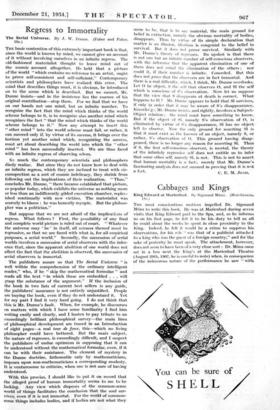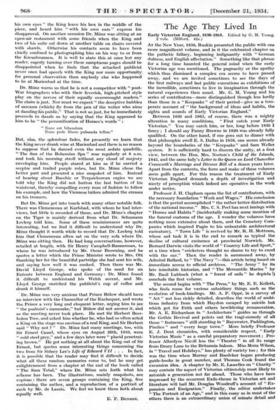Cabbages and Kings
King Edward at Marienbad. By Sigmund Mintz. (Hutchinson: 18s.)
THE most conscientious motives impelled Dr. Sigmund Miinz to write this book. He was at Marienbad during seven visits that King Edward paid to the Spa, and, so he informs us on his first page, he felt it to be his duty to tell us all he could about the weeks he spent in close proxiMity to the King. Indeed, he felt it would be a crime to suppress his observations, for his role " was that of a publicist attachei to a king who was the guest of a foreign country," and for the sake of posterity he must speak. The attachment, however, does not seem to have been of a very close sort : Dr. Mfinz once sat in a box next the King's at the Marienbad Theatre (August 29th, 1907, he is careful to note) when, in consequence of the indecorous nature of the performance he saw " with his own eyes " the King leave his box in the middle of the . piece, and heard him " with his own ears " express his clisapprovaL On another occasion Dr. Miinz was sitting at an open-air restaurant with some friends when the King and two of his suite sat down at another table on chairs covered with shawls. Otherwise his contacts seem to have been chiefly confined to photographing him on his way to or from the Kreuzbrunnen. It is well to state this at once lest any reader, eagerly turning over these sumptuous, pages should be disappointed when he finds that the attached publicist never once had speech with the King nor more opportunity, for personal observation than anybody else who happened to be at Marienbad at the time.
Dr. Miinz warns us that he is not a competitor with " post- War biographers who with their feverish, high-pitched style play on the nerves of their equally overwrought readers." The claim is just. Nor must we expect "-the deceptive bubbles of sarcasm (which) fly from the pen of the writer who aims at dazzling his public." That is not so just, for he immediately proceeds to dazzle us by saying that the King appeared to him to be " the personification of Horace's words "
" Nunc est bibendum Nune pede libero pulsanda tellus."
But, alas, the splendour fades, for presently we learn that the King never drank wine at Marienbad and there is no reason to suppose that he danced even the most sedate quadrille. " The Sun of the Bohemian Spa " rose regularly at 8 a.m. and took his morning stroll without any cloud of majesty enveloping him. People stared at him as if he carried a sceptre and trailed purple robes, but Dr. Miinz chose the better part and procured a nice snapshot of him. Instead of hearing about Bacchic or Terpsichorean orgies we are told why the King did not button the last button of his waistcoat, thereby compelling every man of fashion to follow his example, and how the Viennese tailors admired the creases on his trousers.
But Dr. Miinz got into touch with many other notable folk. There was Clemenceau at Karlsbad, with whom he had inter- views, but little is recorded of these, and Dr. Miinz's chapter on the Tiger is mainly derived from what Dr. Schumann Leclerg told him. Some of these reminiscences are quite interesting, but we find it difficult to understand why Dr. Miinz thought it worth while to record that Dr. , Leclerg told him that Clemenceau often sat on the very sofa where Dr. Miinz was sitting then. He had long conversations, however, retailed at length, with Sir Henry Campbell-Bannerman, to whom he was introduced by Mr. Oscar Browning, and he quotes a letter which the Prime Minister wrote to Mrs. Ott thanking her for the beautiful partridge she had sent his wife, and saying how well it was cooked. Then there was Mr. David Lloyd George, who spoke of the need for an Entente between England and Germany : Dr. Miinz found it difficult to understand his Welsh accent, and Mr. Lloyd George snatched the publicist's cup pf coffee and drank it himself.
Dr. Manz was very anxious that Prince Billow shculd have an interview with the Chancellor of the Exchequer, and wrote the Prince a very Long and eloquent letter, urging him to and " the psalmist's namesake," but Billow did not answer it, and so the meeting never took place. He met Sir Herbert Beer- bohm Tree, and asked him whether he, who had so often acted a King on the stage was envious of a real King, and Sir Herbert said " Why not ? " Dr. Miinz had many meetings, too, with Sir Ernest Cassel, whose eyes on August 26th, 1910, were " cold steel grey," and a few days later were " placid penetrat- ing brown." He got nothing at all about the King out of Sir Ernest, but quotes some interesting things concerning the two from Sir Sidney Lee's Life of Edward VII . . . In fact, it is possible that the reader may find it difficult to decide what all these random memories come to, but he may get enlightenment from a chapter at the end of the book called " The Sum Total," where Dr. Miinz sets forth what his scheme has been. The illustrations, mainly snapshots, are copious : there are seven groups containing the King, five containing the author, and a reproduction of a portrait of each by Mr. de Laszlo. We feel we kndvi them both about equally well.
E. F. BENSON.



































 Previous page
Previous page